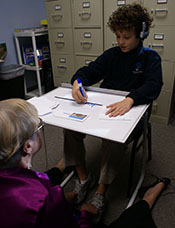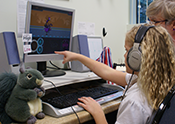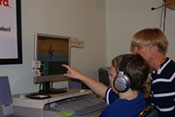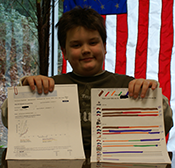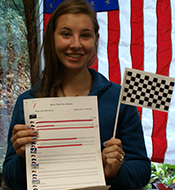Auditory Processing Therapy
“Unless There is a Distinction…”
1st Corinthians 14:6-12 is a well-known and loved Bible text. The Lord has a primary message in that scripture that is of utmost importance to all Christians. However, there is also an underlying truth that I believe is critical to helping individuals improve their speech, language and learning skills.
Look at verse 7, it says:
Even in the case of life-less things that make sounds, such as the flute or harp, how will anyone know what tune is being played unless there is a distinction in the notes?
Look at verse 9, it says:
So it is with you. Unless you speak intelligible words with your tongue, how will anyone know what you are saying?
Look at verse 11, it says:
If I then do not grasp the meaning of what someone is saying, I am a foreigner to the speaker, and he is a foreigner to me.
In a child’s normal development, it is natural for him/her to learn to hear smaller and smaller pieces of sounds. Research has proven that healthy babies who are six months old and above can hear small pieces of sound, sounds as small as 10 milliseconds in duration. They can even discriminate or hear the distinctive differences between these small pieces of sounds. The reason that is so critical is that speech sounds, or phonemes, are very small pieces of sound. For example, the difference between “pet” and “bet” is only a 30 millisecond sweeping sound of ‘puh’ or ‘buh’. So, if a child has an Auditory Processing Disorder, he/she is unable to capture and discriminate those very small pieces of sound. Children or adults who have an Auditory Processing Disorder need a much larger piece of sound, maybe as large as 100 to 200 milliseconds long. This is not a hearing problem; it is a processing problem.
The first step, according to the Scripture, is for the child to learn to hear “a distinction in the notes” or to discriminate notes or pure tones. The first step, therapeutically, is to help the child learn how to discriminate pairs of tones. One of the games in the Fast ForWord Program is called
Sky Gym or Space Racer. It is a 15 to 20 minute exercise in discriminating pairs of sweeping tones. Are the two tones sweeping “high/high” or “low/low” or “high/low” or “low/high?” Once a child learns that distinction, the two tones are then presented closer and closer together by increments of 5 milliseconds on this adaptive computer program.
The next step, according to the Scripture, is an expressive task. It involves clear speech intelligibility. The Lord placed good auditory (listening) discrimination before good speech intelligibility. This is no mere coincidence. Generally, the child who does not have good auditory discrimination skills does not have clear, well enunciated speech.
The final step, according the Word, is the auditory comprehension task. That is improved auditory comprehension skills in conversational speech. For the child who does not have good auditory discrimination skills he/she does not readily understand all of what is spoken.
It would be like trying to listen to a foreigner and be unable to understand all of what was being said.
The good news for these children is that an auditory discrimination deficit is completely remediable. It will take a commitment of time, energy, and resources, but it can be done. Thank the Good Lord we live in this day and age when knowledge has increased dramatically. The discovery that timing is critical to the discrimination of auditorially presented information was revealed by Dr. Paula Tallal in the early 1970’s. The discovery that the brain can develop new pathways in the brain was established by Dr. Michael Merzenich. Now today, with advanced computer technology and global communication capabilities, we can provide this child with the powerful interactive adaptive program called Fast ForWord through Scientific Learning Corporation. This program has been patented and proven to address that critical timing component.
As the child’s auditory discrimination skills improve, then the child’s auditory comprehension, auditory memory and verbal expression skills improve concurrently. Hearing “a distinction” is critical to good success in speech, language, and learning skills for all students no matter what age. The student’s age and skills will determine the appropriate entry point for Auditory Processing Therapy. For more information about Scientific Learning Corporation and these four programs, please see:
Fast ForWord Language Vs 2 (children ages 5 – 12)
Fast ForWord Language to Reading Vs 2 (adolescent)
Fast ForWord Literacy (third grade to adolescent)
Fast ForWord Literacy Advanced (adolescent to above)
